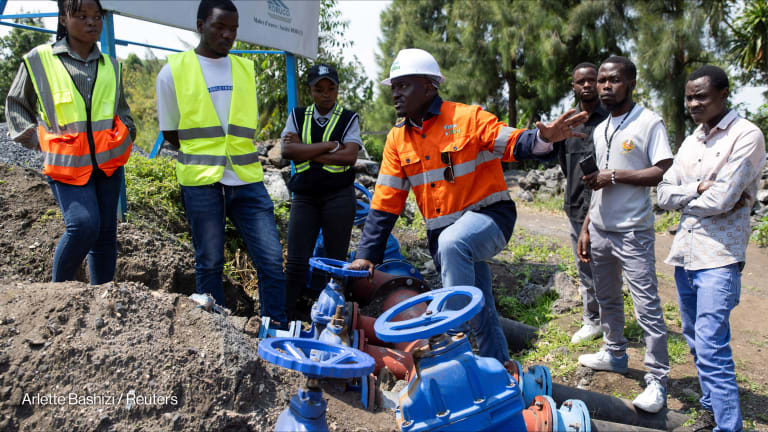
The results are in and it’s four more years for Barack Obama — an outcome that the majority of U.S. aid supporters and advocates deem favorable.
Despite both candidates voicing support for U.S. engagement in the world and agreement on the moral imperatives of foreign aid, members of the development community are more likely relieved that it will still be Obama sitting in the Oval Office come January.
Obama’s track record in pushing for robust funding of the U.S. international affairs budget is just one reason. His support for reforms to how the United States does development, including elevating it as a pillar of foreign policy alongside defense and diplomacy, is another.
But as optimistic and welcoming the members of the aid community are, they are also realistic. And most recognize that one of the Obama administration’s biggest challenges is just around the corner: The U.S. Congress returns Nov. 13 to start a “lame duck” session that is expected to focus on sequestration and budget cuts.
The U.S. Global Leadership Coalition suggested Democrats should use the momentum of the election to push a budget deal that prevents sequestration, which could lead to deep cuts to the U.S. foreign aid budget. Lawmakers may also finalize fiscal year 2013 appropriations bill through an omnibus bill, USGLC noted.
Bolder and stronger commitments
USGLC is among several members of the aid community that welcomed Obama’s return to the White House. For his second term, the group said to watch for a greater focus on Africa’s food security and health sector, accountability and transparency, and partnerships with the private sector. These areas, USGLC said, are “important opportunities to build on the momentum of the first term on development agenda.”
George Ingram, co-chair of the Modernizing Foreign Assistance Network, also highlighted the need to “build and solidify reforms Obama started in his first term. Mark Lotwis, senior director of public policy at InterAction, meanwhile, called for “bolder” commitments. Another theme that cuts across these various calls from aid groups and development organizations: Strengthen key initiatives such as the President’s Emergency Plan for AIDS Relief, Global Health Initiative and Feed the Future.
Obama, in various speeches on the campaign trail, did hint that such plans are on the table. Notably, he said in a statement to ONE that innovation, partnerships and better use of technologies are among his development priorities.
The World Resources Institute, meanwhile, honed in on climate change. WRI President Andrew Steer commended Obama on his actions on climate change in his first term but stressed that those “aren’t enough.” The president, Steer said, should take a more constructive role in climate change negotiations — a topic that the U.S. public appears to be warming up to.
Contractors and implementers, meanwhile, have offered support in implementing the U.S. Agency for International Development reform agenda,USAID Forward, and “getting it right.” It is important that competition to supportUSAID programs remains an open process where “all competitors are judged by the same standards of quality, value and accountability,” the Coalition of International Development Companies, said in an email to Devex.
Same, yet different
Aside from Obama’s re-election, the results of the Congressional elections hint at the future direction of U.S foreign aid.
Republicans have retained their hold of the House and Democrats of the Senate, but outcomes of a number of races suggest leadership changes at key committees in both chambers.
John Kerry, for one, could leave his post as chairman of the Senate Foreign Relations Committee if tapped to replace U.S. Secretary Hillary Clinton, who is not expected to stay beyond the next few months. Richard Lugar is also not returning as ranking member after losing his seat in the primaries.
Rep. Howard Berman, a staunch supporter of foreign aid reform, lost his seat to fellow Democrat Rep. Brad Sherman, who according to USGLC is also a strong contender for the ranking member position Berman would vacate at the House Foreign Affairs Committee. The committee is also expected to have new leadership as Rep. Ileana Ros-Lehtinen is forced by term limits to step down as chairwoman.
Meanwhile, Republican Rep. Kay Granger of Texas and Democrat Rep. Nita Lowey of New York are expected to remain in their post as chairwoman and ranking member of the state and foreign operations panel of the House Appropriations Committee.
The election also yielded a number of new faces with records of supporting foreign aid. USGLC named a few, including Republican Sens. Deb Fischer of Nevada and Ted Cruz of Texas, Democratic Sens. Tammy Baldwin of Wisconsin and Elizabeth Warren of Massachusetts, Republican Rep. Susan Brooks of Indiana, and Democratic Rep. Donald Payne, Jr. of New Jersey.
In the face of all these changes, aid advocates’ call for Congress remains the same: strong bipartisan support for robust funding of the U.S. international affairs budget.
Read more:
Read more on U.S. aid reform online, and subscribe to The Development Newswire to receive top international development headlines from the world’s leading donors, news sources and opinion leaders — emailed to you FREE every business day.
Search for articles
Most Read
- 1
- 2
- 3
- 4
- 5








